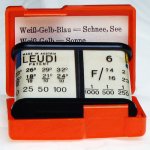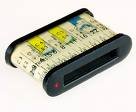ernesto
Well-known
Hello,
I have this strange exposure calculator, that looks very simple and old. It is a Orange Plastic piece about 3 cm x 2 cm x 1 cm.
If you look trhough it, you will see a semitransparent numbered scale, where each number is darker than the previous, so depending on the lighting scene there will be an almost invisible number, while others will not be visible at all.
Using that key number there is a celuloid sliding table in the outside, that can be aligned to the key numbr, then you will have the possible shutter speeed, together with film speed and lens apperture.
I have never used it, because I do not know the accuracy nor the right circunstances to use it.
Any help will be greatly appreciated!
Thanks.
Ernesto
I have this strange exposure calculator, that looks very simple and old. It is a Orange Plastic piece about 3 cm x 2 cm x 1 cm.
If you look trhough it, you will see a semitransparent numbered scale, where each number is darker than the previous, so depending on the lighting scene there will be an almost invisible number, while others will not be visible at all.
Using that key number there is a celuloid sliding table in the outside, that can be aligned to the key numbr, then you will have the possible shutter speeed, together with film speed and lens apperture.
I have never used it, because I do not know the accuracy nor the right circunstances to use it.
Any help will be greatly appreciated!
Thanks.
Ernesto


